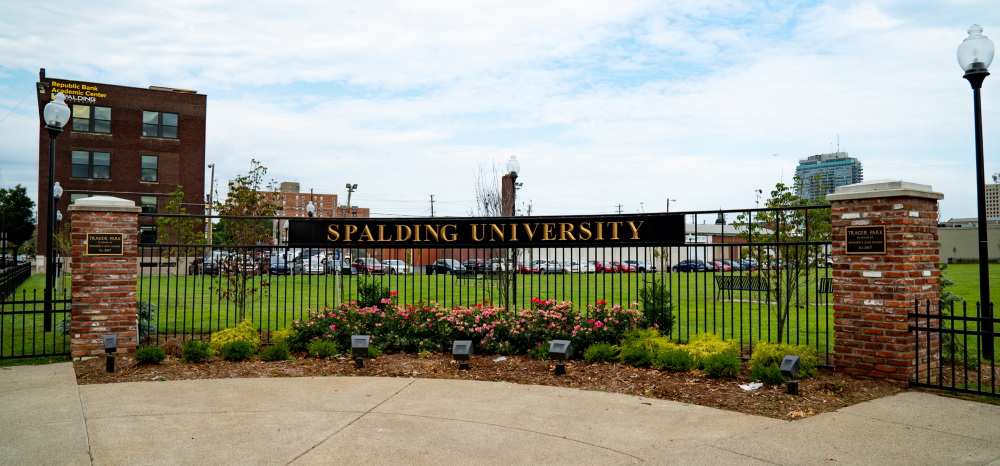Learn more about the Doctor of Social Work program.
January 30 @ 6:00 pm - 7:00 pmInfo Session: DSW
Learn more about the Doctor of Social Work program.
March 12 @ 12:00 pm - 1:00 pmInfo Session: DSW

The Spalding University School of Social Work is taking the next step in its social justice mission by launching the first Doctor of Social Work (DSW) program in Louisville and one of the first in Kentucky. The move addresses a societal need to prepare a greater number of social workers – especially those of color and from other minority groups – to lead nonprofit organizations, teach on college social work faculties and serve in advanced clinical practice.
Spalding’s DSW program will launch its first cohort in August 2020, providing master’s-level social workers with advanced professional development for trauma-informed practice and leadership.
In a society grappling with trauma related to violence, addiction and economic disparity, the number of social work jobs at all levels is expected to grow by 16 percent in the period from 2016 to 2026, according to the U.S. Bureau of Labor Statistics. The Spalding DSW program will help meet that demand by producing more doctorate-level social workers who are qualified to teach the next generation of college social work students or to lead the organizations that will ultimately employ them.
There are no Doctor or Social Work programs in Kentucky for the current 2019-20 academic year and fewer than 20 nationally, meaning that “Spalding’s DSW program will fill an important space in social work education in our region,” Spalding School of Social Work Chair Dr. Shannon Cambron said.
“There is no doubt that the world needs more social workers, and for that to happen, social workers need people to train and lead them,” Cambron said. “Spalding’s DSW program will prepare practicing social workers to become those faculty instructors and nonprofit leaders that our industry critically needs. In particular, we encourage students of diverse backgrounds – in terms of race, religion, sexual orientation and gender identity – to pursue their doctorate with us and help infuse agencies and schools with social work leaders who look, think, worship and love like the clients they serve and the students they teach.”
Designed with working professionals in mind, Spalding’s 48-credit-hour program is meant to be completed over four years (eight semesters), with the final year dedicated to the completion of a capstone project. The program will be presented in a hybrid, low-residency format of online lessons and a total of 12 one-day, on-campus sessions per year of workshops, lectures and group discussions. For those who seek a faster pace, accelerated options will be available.
The Spalding DSW offers a choice of two academic tracks: an Advanced Clinical Practice Track and a Leadership and Administration Track.
Compared with Doctor of Philosophy (PhD) in Social Work programs, which focus primarily on the collection and publication of research, Spalding’s DSW program focuses on advancing the clinical and leadership skills of practicing social workers.
“We’ll prepare DSW students in a way that unpacks what trauma looks like not just from a clinical perspective and how we work with clients and families but how trauma affects all of those who work on the front lines of a nonprofit agency,” Cambron said. She said that curriculum will also emphasize how social workers can understand and recognize explicit and implicit biases.
The DSW Leadership and Administration Track is designed to help social workers, in particular those of minority backgrounds, attain management and administrative skills necessary to rise the ranks and lead successful organizations. Year 3 courses in the Leadership and Administration Track include Grants and Financial Management; Leadership, Administration and Supervision; and Strategic Planning for Social Change.
“It will transform agencies both locally and regionally to be led by advanced-level social workers who understand, first and foremost, vulnerable populations and the clients they’re serving while also having significant leadership skills,” Cambron said.
Applications for Spalding’s first DSW cohort can be submitted through our Doctor of Social Work page with a deadline of April 30, 2020; there is no application fee.

Members of the faculty and staff of Spalding’s School of Social Work
For the program’s first year, Cambron will share DSW program director duties with School of Social Work’ Director of Graduate Education, Dr. Cynthia Conley, who is a leading researcher and practitioner on LGBTQ+ issues locally and nationally. Cambron, meanwhile, is a scholar and community advocate on issues of racial equity, institutional oppression and gun violence.
The creation of the DSW expands the Spalding School of Social Work in a way that aligns with the university’s mission and its roots in social justice.
The private university, located in downtown Louisville for 100 years, was founded in 1814 by Catholic leader Mother Catherine Spalding and the Sisters of Charity of Nazareth. Dedicated to serving the poor and the sick while also advancing education in the state, Catherine Spalding has been called an early leader of social work in Kentucky. The Spalding University mission statement reads that the institution is “dedicated to meeting the needs of the times in the tradition of the Sisters of Charity of Nazareth … with emphasis on service and the promotion of peace and justice.”
“Spalding University provides high-touch doctoral education in healthcare-related and leadership-focused programs,” Dean of Graduate Education Dr. Kurt Jefferson said. “The new Doctor of Social Work degree program will help train leaders to solve problems and think deeply about an array of societal issues that need immediate attention.”
For more information, visit our Doctor of Social Work page.
Learn more about the Doctor of Social Work program.
January 30 @ 6:00 pm - 7:00 pmInfo Session: DSW
Learn more about the Doctor of Social Work program.
March 12 @ 12:00 pm - 1:00 pmInfo Session: DSW